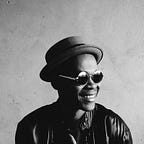Lwazi Gwala was in Cape Town some three weeks to the Friday of the Beyoncé-curated Lion King: The Gift soundtrack release. The producer, better known by his deejay name, Lag, had a studio session with two heat-makers, Toolz and Static, who work with the Khayelitsha-based selectah, Aux Womdantso.
Until then, only people in his inner circle of associates knew that the chart-topping megastar’s vocals, surely the most influential pop figure of our age, had graced a song that the Clermont-born gqom originator played a part in.
The other hand blazing on that song is Moses Boyd’s, the lesser-known, none-the-less-influential London-based producer, drummer and bandleader.
In a way, that Friday was a turning point for black trans-Atlantic relations; for the gqom sound that DJ Lag had been championing since 2012; and for the steady collapse of genre — because what does one call a sound produced by world-leading gqom and jazz figureheads which lands on a pop record?
Almost a month to that Friday, DJ Lag is in Jozi doing what every artist worth a thought doesn’t necessarily enjoy performing, but recognises and appreciates the benefits of: press runs. Our meeting takes place during the afternoon at Braamfontein’s Artivist/Untitled. The venue’s co-owner and scene aficionado DJ Bionic approaches to greet, and half-jokingly proposes that the venue should host a ‘young champagne gqom party’ headlined by DJ Lag. The producer laughs, lets out a ‘yeah, we should do it’ in agreement.
He’d had to keep the Lion King placement a relative secret eversince Beyoncé’s team hunted him down following his song “Tip to New York”’s usage as an interlude during the star’s appearance at the Global Citizen event in December 2018.
They went down to Durban to meet with him the following day.
“[They] told me that Beyoncé’s working on an album. I gave them six instrumentals to choose from, they picked two. They didn’t reveal much else,” he tells me.
This past June, he made a trip to Los Angeles to work further on the music. He was presented with Beyoncé’s verse, as well as Busiswa’s, who also features on the song with fellow Mzansian, Moonchild; Philadelphia-based Tierra Whack; Lagosian pop queen Yemi Alade; and songwriter/producer Nija Charles.
The Lion King nod is doubtless a huge moment for him, but doesn’t symbolize a breakthrough for the trailblazer who credits himself, along with Durban-side names like Sbucardo da Deejay, Rudeboyz and Naked Boyz, as the originator of gqom, the bare-bones three-beat sound that first gathered fanfare in the Durban underground many years before Babes Wodumo’s “Wololo” took the genre and cast it all over the mainstream in 2016, the same year that Lag considers the tipping point in his career.
“[It was] during my first tour. I went to China, South Korea, Japan, Italy, Poland. Things really started changing in 2017. That’s when I met M.I.A, and we recorded [an unreleased] track in Reunion island during the Sakifo festival,” he says.
He’s also collaborated with brostep rubble-rouser Skrillex, appeared on the Afropunk stages in New York and Paris, and debuted at Spain’s Sonar this year.
In 2017 when the gqom sound hadn’t been replaced by Amapiano as the de-facto party music throughout Mzansi, it emerged that Distruction Boyz, Dladla Mshunqisi and Benny Maverick’s “Omunye” had the same structure as DJ Lag’s “Trip to New York”. The Distruction Boyz joint was at that point widely-played, instantly recognizable by its filtered, repetitive piano chords which fade in and out of the dark, detuned orchestral strings that epitomise gqom.
A “forensic copyright” investigation into the matter concluded as much.
“I have found that, as a result of the tempo, key signature, instrumentation and lead melodies being identical in both musical works, Omunye was indeed copied from Trip to New York,” read part of the comparative analysis authored by Imilozi Music.
One half of the Distruction Boyz duo, Cue, had responded by saying that they came across the banger on Soundcloud. “We’re creators. We never steal. Everything was done right,” he’d added.
DJ Mphyd, from whose Soundcloud page the song was first heard, also denied wrongdoing on his end. Afrotainment’s DJ Tira eventually admitted guilt, and promised that a peaceful resolution would be sought out, for the culture.
“Distruction Boyz are new [on the scene],” says Lag. “Them and others came on and changed the whole sound. But mine has remained the same throughout.”
As it stands, DJ Tira has reneged on the agreement which granted DJ Lag authorship for “Omunye”.
When I first encountered an 18 year-old DJ Lag tinkering with the FL Studio sequencer while talking through the origins of gqom in his mother’s living room in Clermont, it was impossible to see how such a scene-specific bheng would affect the world.
In 2019, the 23 year-old Gqom King is not only thriving in his career, he’s figuring out how to be a label head and event organizer through his newly-minted Ice Drop records (his collaboration with Shekhinah was released under the imprint), and his steady-growing homecoming Something For Clermont party that had revellers threatening to tear down the venue’s protective barriers in order to get in.
Through Lag, the underground thrives.
